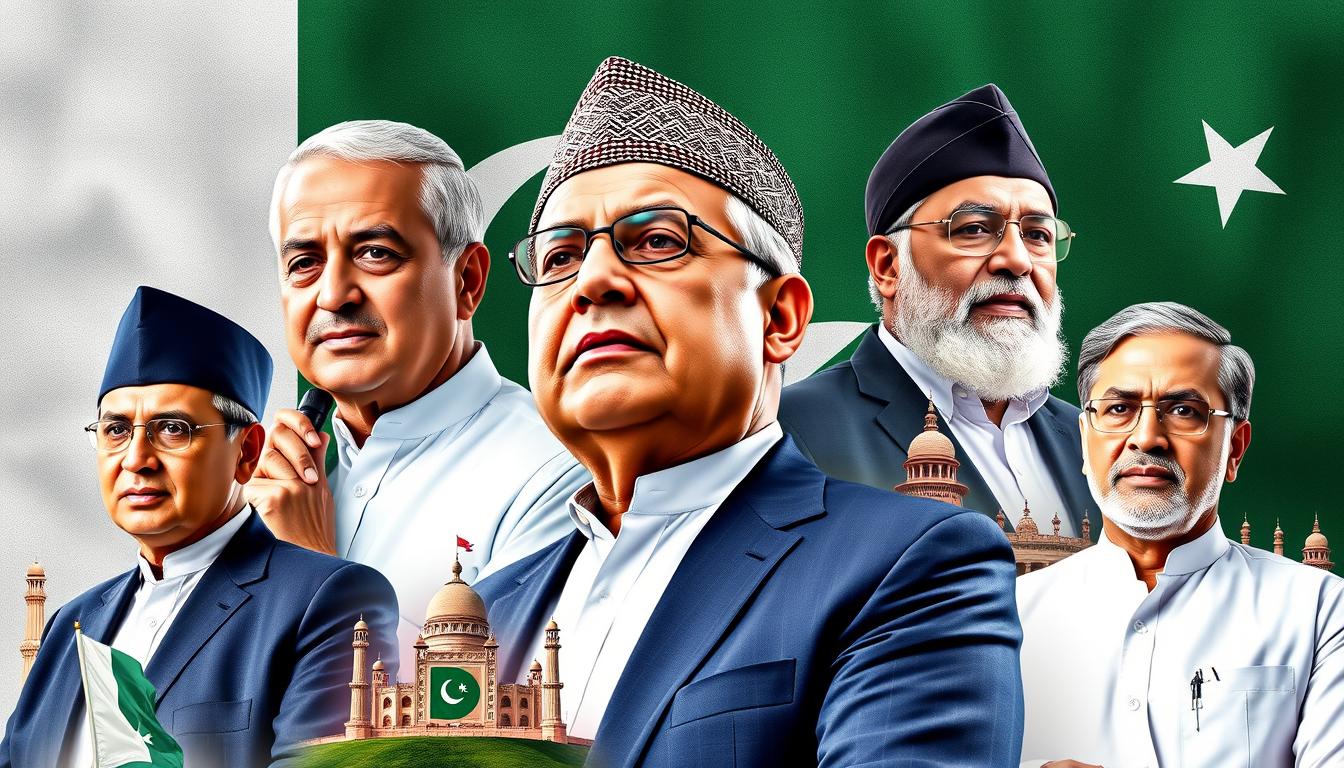In Pakistan, a nation with a complex history and many challenges, the power brokers are key. This country, the sixth-largest by population1, is expected to grow and become the largest Muslim nation1. With a growing nuclear arsenal1 and a strategic location2, these influential people guide Pakistan’s future. They do this in a time of violence and instability1.
The power dynamics in Pakistan are complex, shaped by its colonial past2. This history has influenced its setup and how people interact2. Elite interests control politics and the economy, making sustainable political growth hard2. The military’s role in politics, often due to civilian failure3, adds to the complexity of governance.
Pakistan is in a fragile state, with little resilience at both state and societal levels2. The role of power brokers in guiding the nation is more important than ever. These influential figures include political dynasties, emerging leaders, religious scholars, economic elites, and civil society activists. They all have a big say in Pakistan’s future.
Key Takeaways:
- Pakistan’s power brokers play a critical role in shaping the nation’s future amidst complex challenges
- The country’s colonial history and elite interests have significantly influenced its power dynamics
- The military’s intervention in politics has further complicated Pakistan’s governance landscape
- Pakistan faces a situation of extreme fragility, emphasizing the importance of its influential figures
- The top 10 power brokers in Pakistan span various sectors, including politics, religion, economy, and civil society
The Enduring Influence of Pakistan’s Colonial Legacy
Pakistan’s politics have been deeply influenced by its time under British rule. The country’s laws are based on common law, shaped by reforms after the Indian Mutiny of 1857-18594. This legacy affects how Pakistan governs and who holds power.
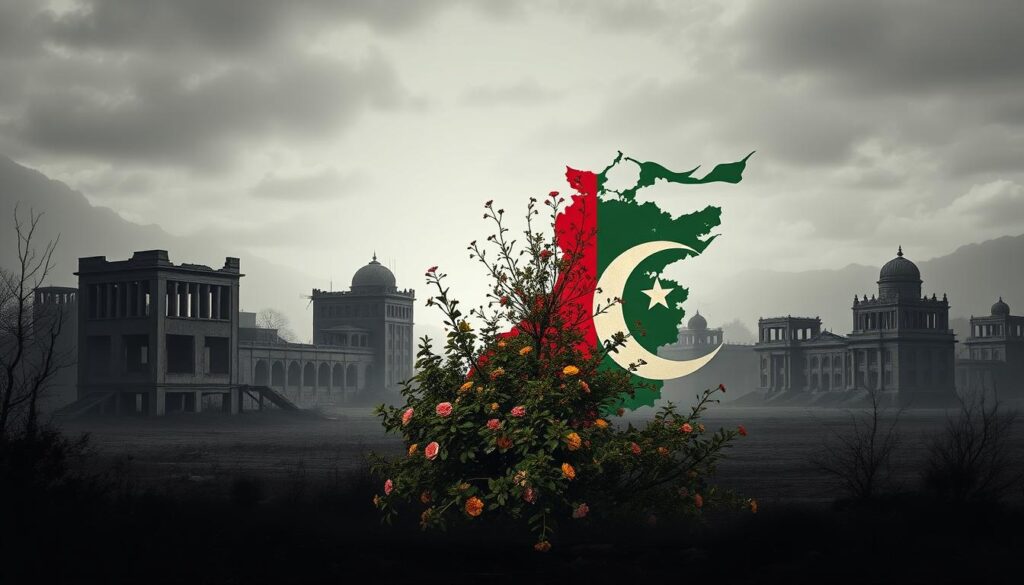
The idea of a feudal landed gentry in Pakistan comes from the British era. The East India Company’s tax system was key to this4. Landowners became important between farmers and the government, thanks to the Mughal Empire’s land grants4.
Impact of British Rule on Pakistan’s Political Landscape
The British wanted to modernize India and control it through the elite, laws, and elections4. This has led to ongoing political issues and doubts about government legitimacy4.
Pakistan has seen military rule for over half its life5. The military has shaped Pakistan’s history and continues to influence politics5. The Supreme Court has backed military coups, making the military very powerful4.
Remnants of the “Martial Races” Ideology in Pakistan’s Army
The “martial races” idea, promoted by the British, still affects the Pakistan Army. They believed certain groups, like Punjabis and Sikhs, were better for military work. Today, most soldiers come from just a few areas, despite these places having a small population.
The war on terror has changed Pakistan’s military and civilian relations5. Despite efforts to strengthen civilian institutions, the military remains very influential5. The relationship between the government, military, and Islamists is complex, adding to Pakistan’s political challenges5.
The Military’s Dominant Role in Pakistani Politics
Since Pakistan gained independence in 1947, the military has greatly influenced its politics. Although direct military takeovers are rare today6, the army’s impact on governance is still strong. This is often at the expense of elected leaders6. The 2018 election, which made Imran Khan Prime Minister, shows the military’s lasting impact on politics7.
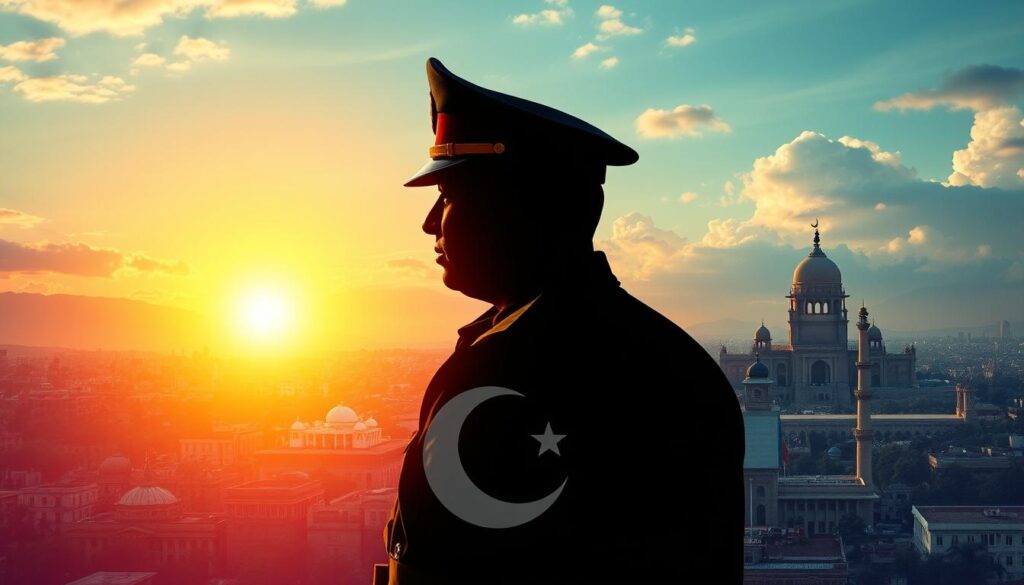
Factors Contributing to the Army’s Political Influence
Several factors have made the military a key player in Pakistani politics. Early leaders like Muhammad Ali Jinnah concentrated power, paving the way for military involvement6. The ethnic divide and weak democratic institutions also helped the military step in6.
The military’s role is also tied to Islamic values, making them seem like protectors of the country and its faith7. This has won them public support, especially in times of crisis or when civilians seem ineffective.
“The pervasive civilian ineptitude in Pakistan created not just the opportunity but, from the perspective of concerned army officers, the need to enter politics and make things right after only a few short years of independence.”
Consequences of Military Interventions in Governance
The military’s role in politics has hindered Pakistan’s democratic growth. The country has seen many coups and periods of military rule, deviating from expected democratic progress7. These actions have weakened civilian institutions and stifled political opposition.
In the 2024 election, the military is seen backing the center-right Pakistan Muslim League (PML)8. This gives the party an unfair advantage in what many see as a rigged election8. The military’s alleged role in shaping election results to block Imran Khan’s party from winning a majority shows its deep political sway87.
Pakistan faces big challenges, like the 2022 floods and economic woes8. The military’s control over politics continues to influence the country’s path. It’s vital to build strong civilian oversight and democratic institutions to reduce the military’s grip and promote a fairer political system.
Civilian Leadership and the Struggle for Democracy
Pakistan’s history is marked by turmoil, yet civilian leaders keep pushing for a stable democracy. For over half of its 75 years, Pakistan has been ruled by military dictators9. The fight for democracy in Pakistan is tough, with civilians facing challenges from the military’s strong presence.
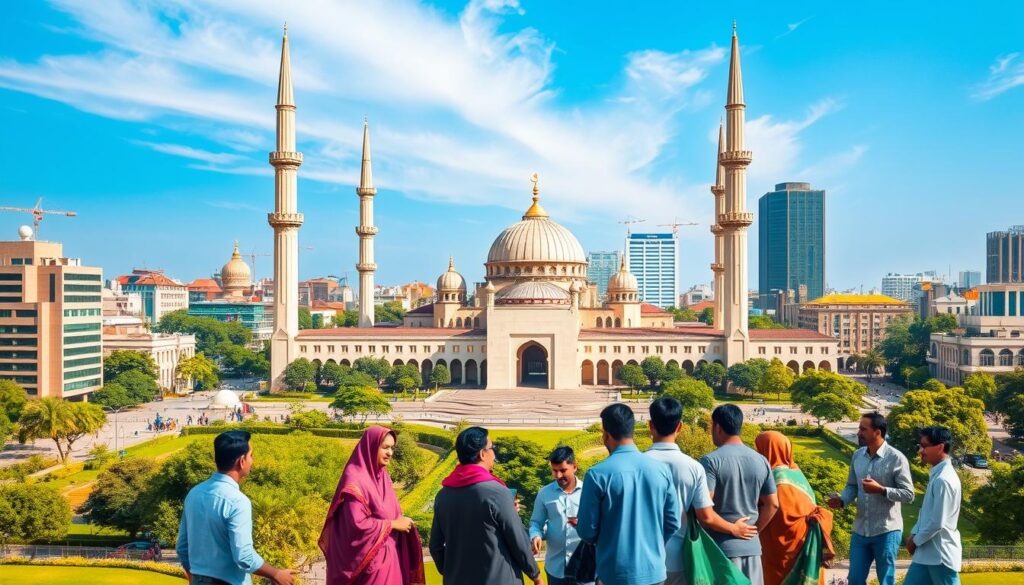
The United States has often sided with Pakistan’s military rulers, not civilian leaders9. This has weakened the relationship between the military and civilians, making democracy hard to achieve9. Freedom worldwide has been falling for 17 years, with 34 countries improving and 35 getting worse in 202210.
Pakistan’s big political parties, like the PPP and PML-N, are often led by powerful families. These parties have ruled, but their efforts are limited by instability, corruption, and military interference. The chance for democracy in Pakistan is based on things like regular elections, more people taking part in politics, and less military control9.
“Democracy is the art and science of running the circus from the monkey cage.” – H.L. Mencken
As freedom worldwide drops, with over half of countries rated Free or Not Free seeing a decline in a decade11, Pakistan’s civilian leaders face a big challenge. The fight for democracy in Pakistan goes on, with civilians trying to gain power and make changes despite the military’s strong influence.
Pakistan Power Brokers: Key Figures in the Political Arena
Pakistan’s politics are shaped by influential families and new leaders. These figures have a big role in guiding the country’s future. Their leadership and vision are crucial for Pakistan’s development.
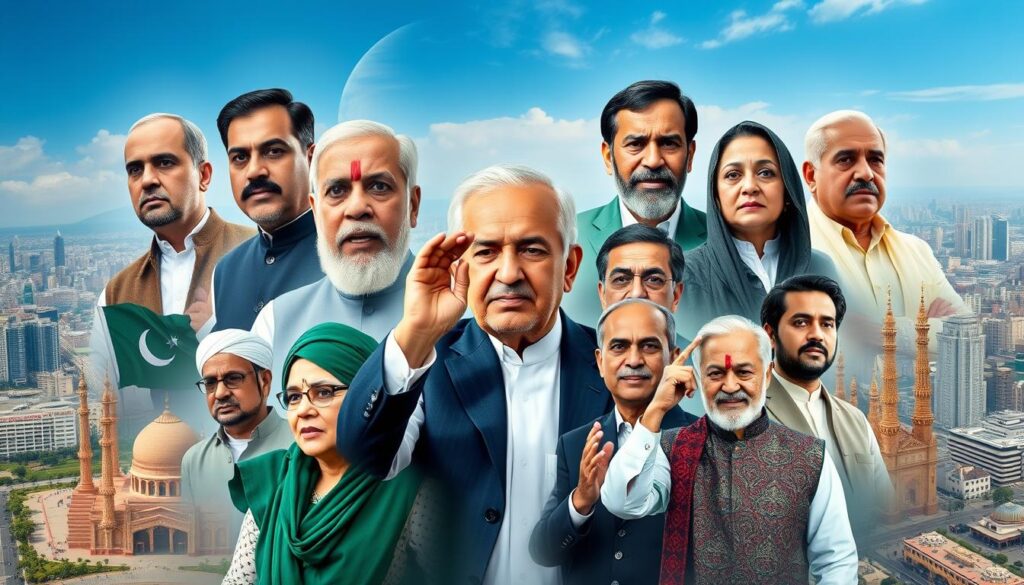
Influential Political Dynasties and Their Impact
Pakistan’s politics have been shaped by families like the Bhuttos and Sharifs. These dynasties have led major parties and held key government roles. They have greatly influenced Pakistan’s path.
The Bhutto family, with Zulfikar Ali Bhutto and Benazir Bhutto, has shaped the PPP. The Sharif family, led by Nawaz Sharif, has also been influential through the PML-N. In the latest election, Imran Khan’s PTI won the most seats but didn’t get a majority12.
The PML-N came second, securing 73 seats12. Now, the PML-N and PPP are talking about forming a coalition. This could keep PTI out of power12.
Emerging Leaders and Their Vision for Pakistan’s Future
New leaders are coming up, aiming to carry on their family’s legacy. They bring fresh views on Pakistan’s problems. Bilawal Bhutto Zardari, son of Benazir Bhutto, leads the PPP, focusing on democracy and welfare.
Maryam Nawaz Sharif, Nawaz Sharif’s daughter, is a key figure in the PML-N. She supports her father’s vision for economic growth and cooperation. Imran Khan, a former cricket star, founded the PTI. His promise to fight corruption has won many supporters13.
In June 2011, Imran Khan was seen as Pakistan’s most popular political leader. 68 percent of people viewed him positively, up from 52 percent in 201013.
| Political Party | Key Figures | Vision for Pakistan |
|---|---|---|
| Pakistan People’s Party (PPP) | Bilawal Bhutto Zardari | Promoting democracy and social welfare |
| Pakistan Muslim League-Nawaz (PML-N) | Maryam Nawaz Sharif | Focusing on economic development and regional cooperation |
| Pakistan Tehreek-e-Insaf (PTI) | Imran Khan | Eliminating corruption and establishing an Islamic Welfare State |
These new leaders face big challenges in Pakistan’s complex politics. Their success in meeting their promises will define Pakistan’s future. They have the chance to change the country’s history by offering a clear vision and gaining public support.
The Role of Religious Leaders in Shaping Public Opinion
In Pakistan, a deeply religious nation, religious leaders and Islamic scholars have a big impact on public opinion. Figures like Maulana Fazlur Rehman, the leader of the Jamiat Ulema-e-Islam (F) party, have many followers. They can rally support for or against political causes.
Their views on Islamic teachings and social issues deeply affect their followers. This makes them key players in Pakistani society.
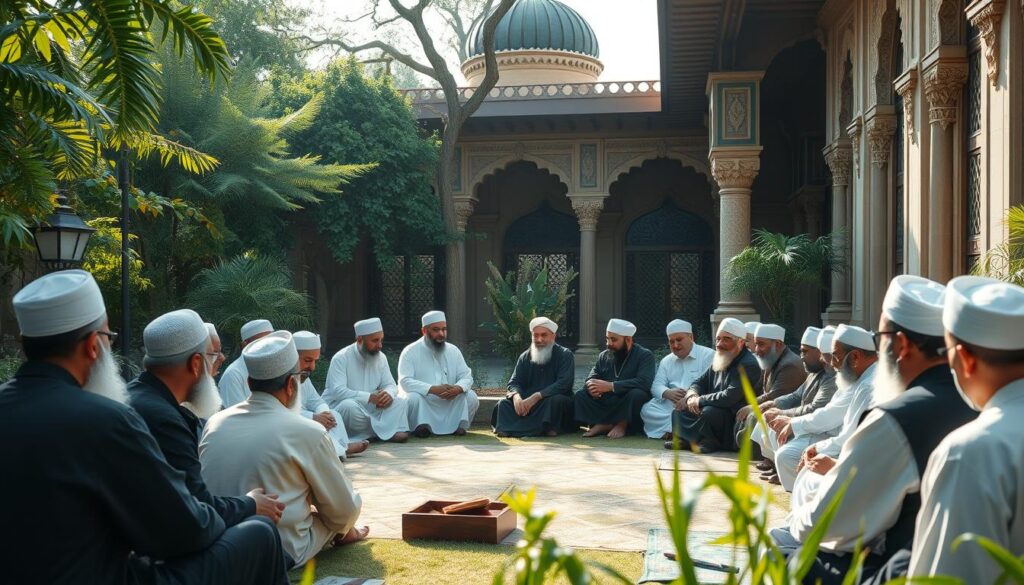
Religious leaders’ influence goes beyond politics. They shape public talk on many topics. Studies show they can change community norms and behaviors14.
Recently, their power was seen in how religious appeals affect following COVID-19 rules14.
Prominent Islamic Scholars and Their Followers
Pakistan has many well-known Islamic scholars with big followings. These scholars, tied to certain schools or institutions, guide their followers’ beliefs. Surveys in Punjab and Quetta show Shia people tend to agree more with tolerant views than Sunnis15.
This shows how religious leaders shape their followers’ views, especially on sectarian harmony.
The Influence of Religious Parties on Political Discourse
Religious parties like Jamiat Ulema-e-Islam (JUI) and Jamaat-e-Islami (JI) are big in Pakistani politics. They team up with other parties and push for Islamic laws. Their strong bases in some areas let them influence politics and rally supporters.
Their role in Pakistan’s politics goes back to the start. A 1982 study by Talbot, I. A. in the Journal of Commonwealth & Comparative Politics looked at the Muslim League’s growth in Punjab16.
But, religious leaders and parties face challenges. Sunni-Shia tensions have plagued Pakistan for decades15. In 2013, 658 people died in sectarian attacks15.
In the first half of 2014, there were 51 sectarian attacks, killing 140 and injuring 19815. These numbers show the tough job religious leaders have in shaping opinion while keeping peace.
Economic Elites and Their Sway on Policy Decisions
Pakistan’s economy is heavily influenced by business tycoons and industrialists. They have a big say in policy decisions. These economic elites in Pakistan often work closely with politicians and military leaders. This helps them protect their interests and stay powerful in different sectors17.
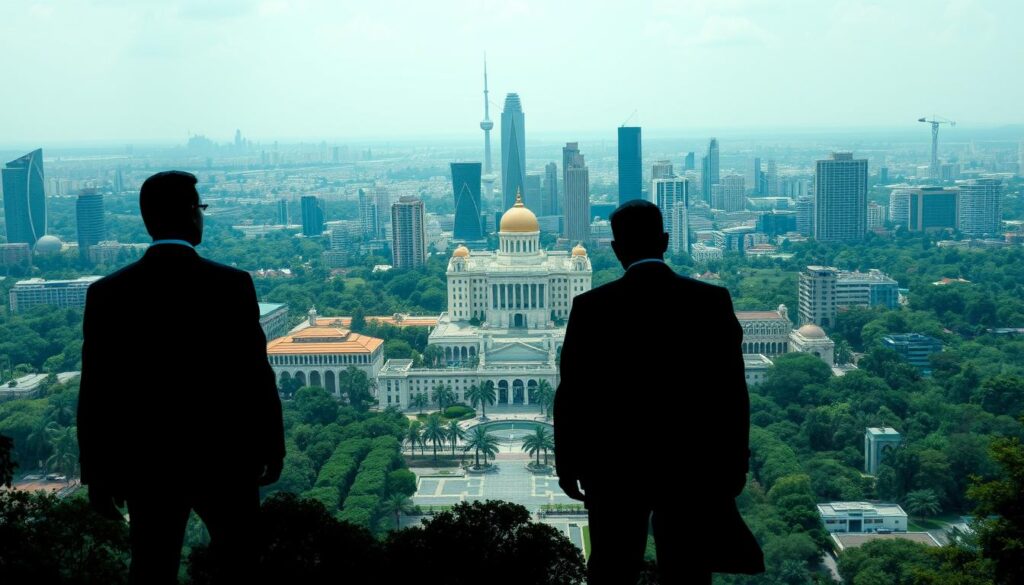
A few families and big companies hold most of the economic power. This leads to policies that favor the elite, sometimes hurting the rest of the people. It causes income inequality and slows down economic growth for everyone18.
The top 10 power brokers in Pakistan make a big impact on policy. Their wealth is much higher than most people’s. This shows how much influence they have18.
The influence of wealthy in pakistani politics is seen in many areas. This includes agriculture, manufacturing, and natural resources. Their power to shape policies on taxes, subsidies, and rules affects Pakistan’s economy and growth19.
“The power of economic elites is a central theme in understanding the political economy of taxation in Latin America and beyond.” – Tasha Fairfield, Private Wealth and Public Revenue in Latin America19
Many factors shape the economic elites in Pakistan. These include social and economic conditions, political culture, and international factors17. The average age of these elites is higher than in other countries. Many have ties to global organizations18.
| Sector | Percentage of Power Brokers |
|---|---|
| Manufacturing | 35% |
| Real Estate | 25% |
| Agriculture | 20% |
| Services | 15% |
| Mining | 5% |
The table shows where the top 10 power brokers have interests18. Manufacturing and real estate are the biggest sectors. Agriculture and services also play a big role. These elites also influence the courts, with many legal cases involving them18.
Many economic elites in Pakistan give to charity to look good. But, their charity efforts are often less than the government projects they get18.
In Pakistan, the role of economic elites and business tycoons in policy is key. It’s important to balance their interests with the needs of all people. This will help Pakistan grow more inclusively and reduce income gaps.
Regional Power Dynamics and Their Impact on Pakistan
Pakistan’s location in South Asia greatly affects its politics and foreign relations. The tensions with India and the growing bond with China have big effects on the country’s stability and growth.
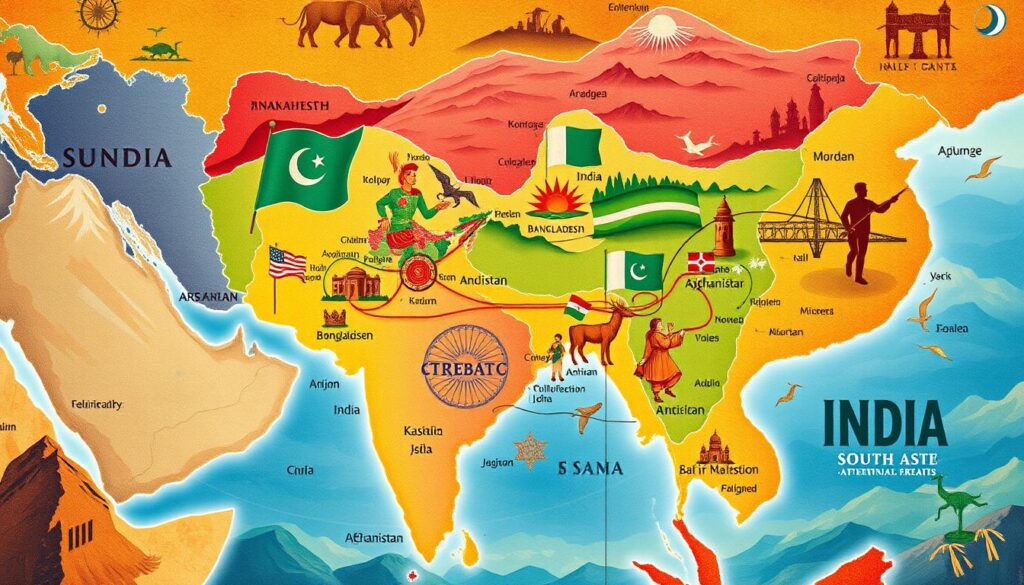
The Influence of India-Pakistan Relations on Domestic Politics
The complicated relationship between India and Pakistan shapes Pakistan’s politics. The Kashmir dispute and old hatreds fuel nationalism, helping politicians gain support20. The military’s strong role in Pakistan’s politics, seen as a defense against India, makes things harder for civilians20.
This struggle between the military, civilians, and Islamists has shaped Pakistan’s government and decision-making20. Focusing on defense against India has taken away from tackling Pakistan’s internal problems21. The tense border and nuclear weapons on both sides add to the pressure21.
This constant alertness has made Pakistan focus less on important social and economic issues.
China’s Growing Economic and Strategic Partnership with Pakistan
China is now a big player in South Asia, especially with Pakistan. The China-Pakistan Economic Corridor (CPEC) is a key part of their partnership. It aims to boost Pakistan’s economy by improving connections, energy, and industry.
But, China’s growing role in Pakistan worries about the country’s freedom and the partnership’s future. Some think Pakistan’s reliance on China might limit its freedom in foreign policy. Also, Chinese investments and workers have caused local anger and social issues.
| Year | Average TTP Attacks per Month |
|---|---|
| 2020 | 14.5 |
| 2022 | 45.8 |
The regional dynamics also affect Pakistan’s security. Militancy has grown, spreading from the edges to the heart of the country, due to the war in Afghanistan21. Separatist movements in Baluchistan and Sindh, and threats from neo-Salafi groups, make security harder21. Despite efforts, violence in FATA and KPK continues, with little progress against insurgents21.
Pakistan’s rivalry with India also shapes its relations, especially in Afghanistan. It tries to keep influence through the Taliban and Haqqani network21. This approach has made Pakistan’s ties with the U.S. and Afghanistan complicated21. In 2018, the U.S. stopped or changed over $800 million in aid to Pakistan because of terrorism concerns22.
The regional power dynamics in South Asia have had a profound impact on Pakistan’s domestic politics, security, and foreign relations. Navigating the complex web of interests and challenges posed by India, China, and Afghanistan will be crucial for Pakistan’s future stability and progress.
Civil Society Activists and Their Fight for Social Change
Pakistan’s civil society activists lead the fight for social change and human rights. They face risks like enforced disappearances and torture23. Yet, they keep pushing for a fair society, despite the odds.
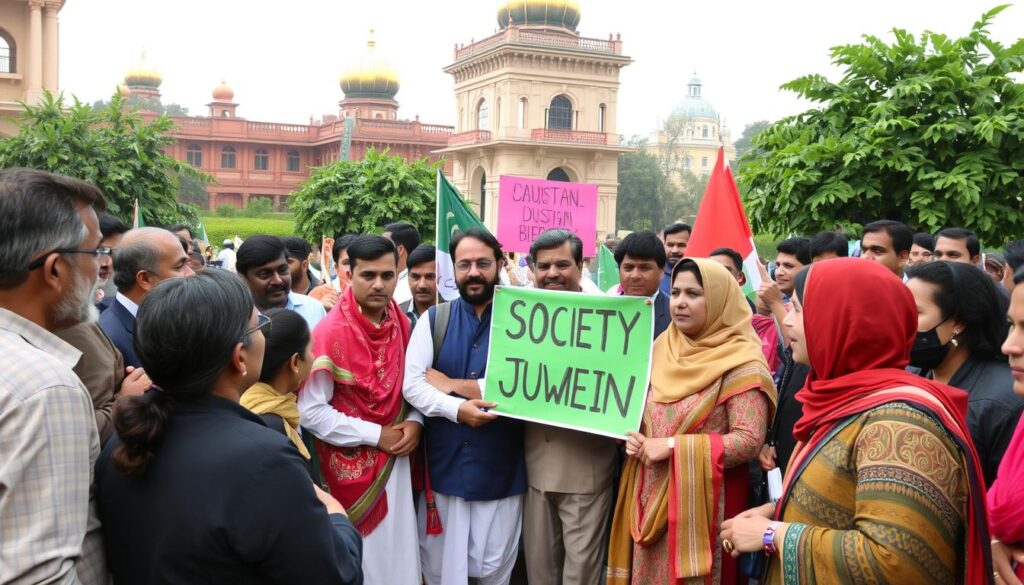
Women’s Rights Advocates and Their Campaigns
Women’s rights advocates in Pakistan fight against gender-based violence and discrimination. Groups like the Women’s Action Forum and the Aurat Foundation push for women’s empowerment. They work hard to change cultural norms that hold women back.
Women in Pakistan still face many challenges, like limited education and healthcare access. But the courage of these activists inspires others to join the fight for gender equality.
Youth Movements Demanding Political Reforms
Pakistan’s youth is becoming more politically active. They demand reforms and transparency from the government. Social media helps them mobilize and challenge the current system.
The youth are fed up with corruption and nepotism in politics23. They want a system that listens to the people’s needs. So, they protest and use online platforms to call for change.
“The government, the opposition, and the military should commit to recognizing and respecting fundamental civil and political freedoms to empower civil society in addressing Pakistan’s multifaceted problems.”23
Civil society activists, women’s rights advocates, and youth movements are crucial for Pakistan’s future. Their work on human rights, gender equality, and reforms is key to a fair and accountable society.
The Media’s Role in Shaping Public Discourse
The media in Pakistan has changed a lot lately. Private TV channels and digital media are now big players. Social media, especially Twitter, lets people share their views and organize protests24. In April 2022, when Prime Minister Imran Khan was removed, Twitter was buzzing with activity24.
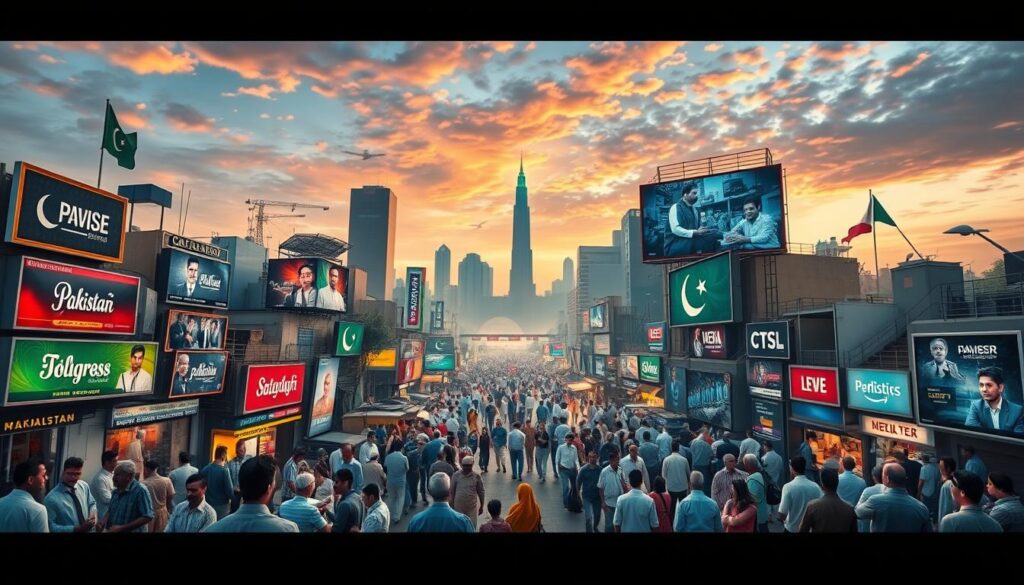
But, press freedom in Pakistan is a big worry. Journalists face threats and censorship for speaking out. Pakistan is seen as the most dangerous place for journalists, with many killed in recent years25. The military’s influence over media is also a topic of debate.
Despite these issues, Pakistani media has grown. Now, there are more journalists and TV stations than ever before25. This growth has brought more diverse views and scrutiny of leaders. But, it also makes investigative journalism riskier.
In a Pew Research Center poll conducted in June 2011, 76% of Pakistanis surveyed believed that the media has a good effect in their country25.
Research shows how social media affects politics in Pakistan. It looks at how it influences people’s decisions and politicians’ strategies24. Studies find that Twitter shapes narratives and public images, and helps form coalitions24.
The changing media scene in Pakistan offers both chances and challenges. Social media helps people engage in politics, but it also spreads false information. As Pakistan deals with its complex issues, the media’s role in shaping opinions is key to its future.
The Future of Pakistan’s Power Dynamics
Pakistan’s political future is uncertain. The country faces many challenges like political instability, economic troubles, security threats, and social gaps. Pakistan must tackle these issues to ensure a stable future in politics and foreign policy26. The rise of Imran Khan’s PTI party, winning 66 seats, has changed the power balance, challenging the military’s dominance27.
Pakistan’s civilian leaders must strengthen democracy and meet the people’s needs. They need to fight corruption, increase transparency, and uphold the law. It’s also key to balance relations with India and Iran for national security and foreign policy26. But, election issues and military interference have raised doubts about the election’s fairness, making it hard for leaders27.
The military, political dynasties, religious leaders, and economic elites will still influence Pakistan’s future. The China-Pakistan Economic Corridor (CPEC) is a key part of Pakistan’s economic strategy26. Yet, civil society and youth movements bring hope for a more inclusive Pakistan. The people’s dream of a democratic Pakistan depends on the efforts of its leaders and power brokers to create a stable, prosperous nation for all.
- The Enduring Influence of Pakistan's Colonial Legacy
- The Military's Dominant Role in Pakistani Politics
- Civilian Leadership and the Struggle for Democracy
- Pakistan Power Brokers: Key Figures in the Political Arena
- The Role of Religious Leaders in Shaping Public Opinion
- Economic Elites and Their Sway on Policy Decisions
- Regional Power Dynamics and Their Impact on Pakistan
- Civil Society Activists and Their Fight for Social Change
- The Media's Role in Shaping Public Discourse
- The Future of Pakistan's Power Dynamics
